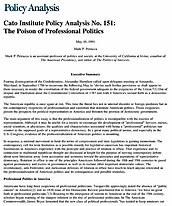The American republic is once again at risk. This time the threat lies not in internal disorder or foreign predators but in the contemporary exigencies of professionalism and careerism that dominate American politics. Those exigencies poison the prospects for political representation in America and threaten the promise of democratic government.
The main argument of this essay is that the professionalization of politics is incompatible with the essence of representation. Although it may be useful for a society to encourage the development of “professional” lawyers, nurses, social scientists, or physicians, the qualities and characteristics associated with being a “professional” politician run counter to the supposed goals of a representative democracy. In a great many political arenas, and especially in the U.S. Congress, evidence of the professionalization of American politics is mounting.
In response, a national movement to limit the terms of congressmen and state legislators is gaining momentum. The contemporary call for term limitation as a possible remedy for legislative careerism has important historical foundations in America’s experience with the principle and practice of rotation in office. That experience and its connection to traditional republican thought are discussed at length for the purpose of moving contemporary debate about term limitation away from accusation and acrimony toward the principles and aspirations of representative democracy. Rotation in office is one of the principles Americans followed during the 18th and 19th centuries to guard against permanency and excess in government as well as to nurture other important democratic values. The revolutionary, anti-Federalist, and Jacksonian defenses of rotation in office have much to teach anyone interested in the professionalization of American politics and its consequences and possible remedies.

